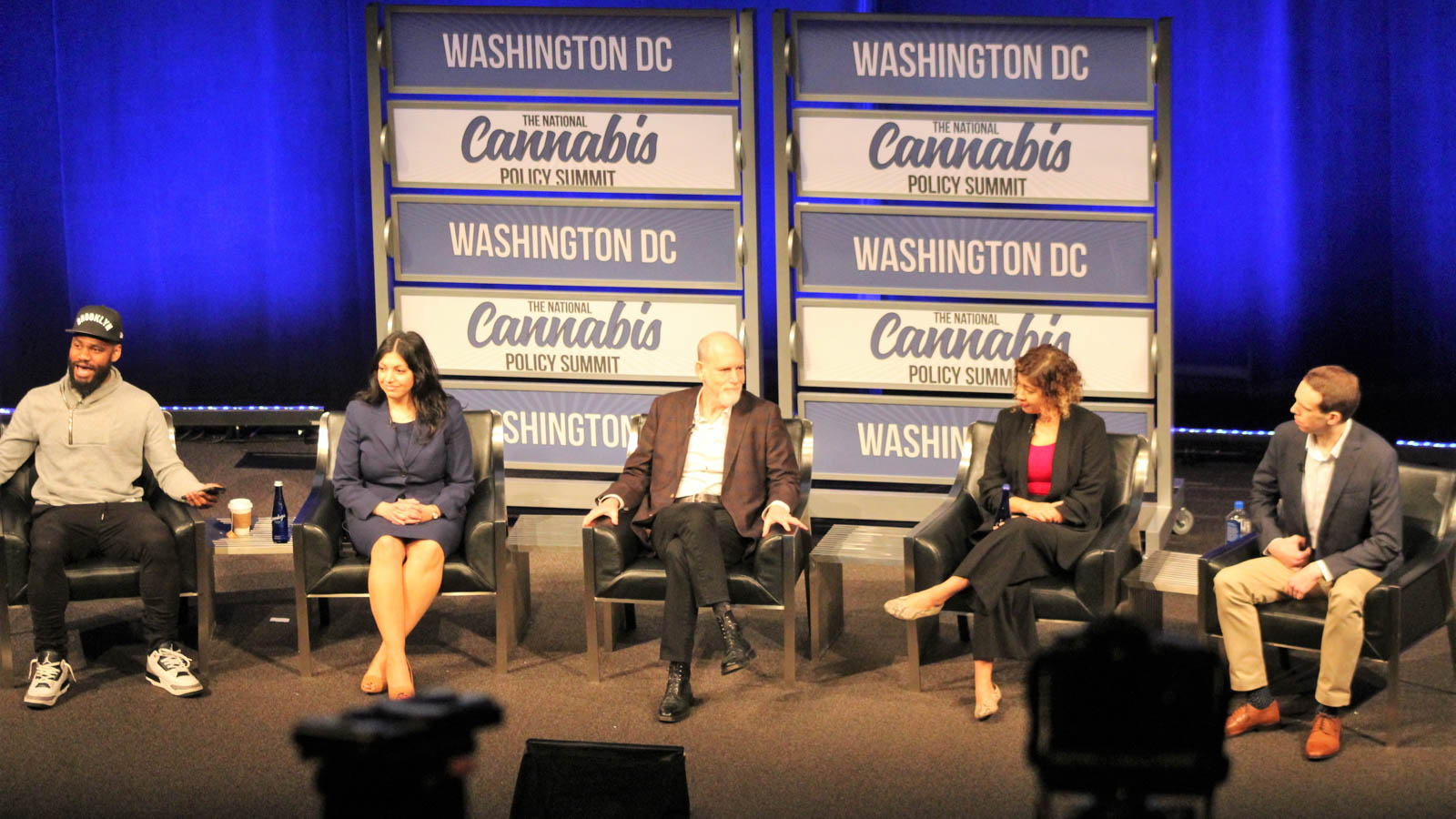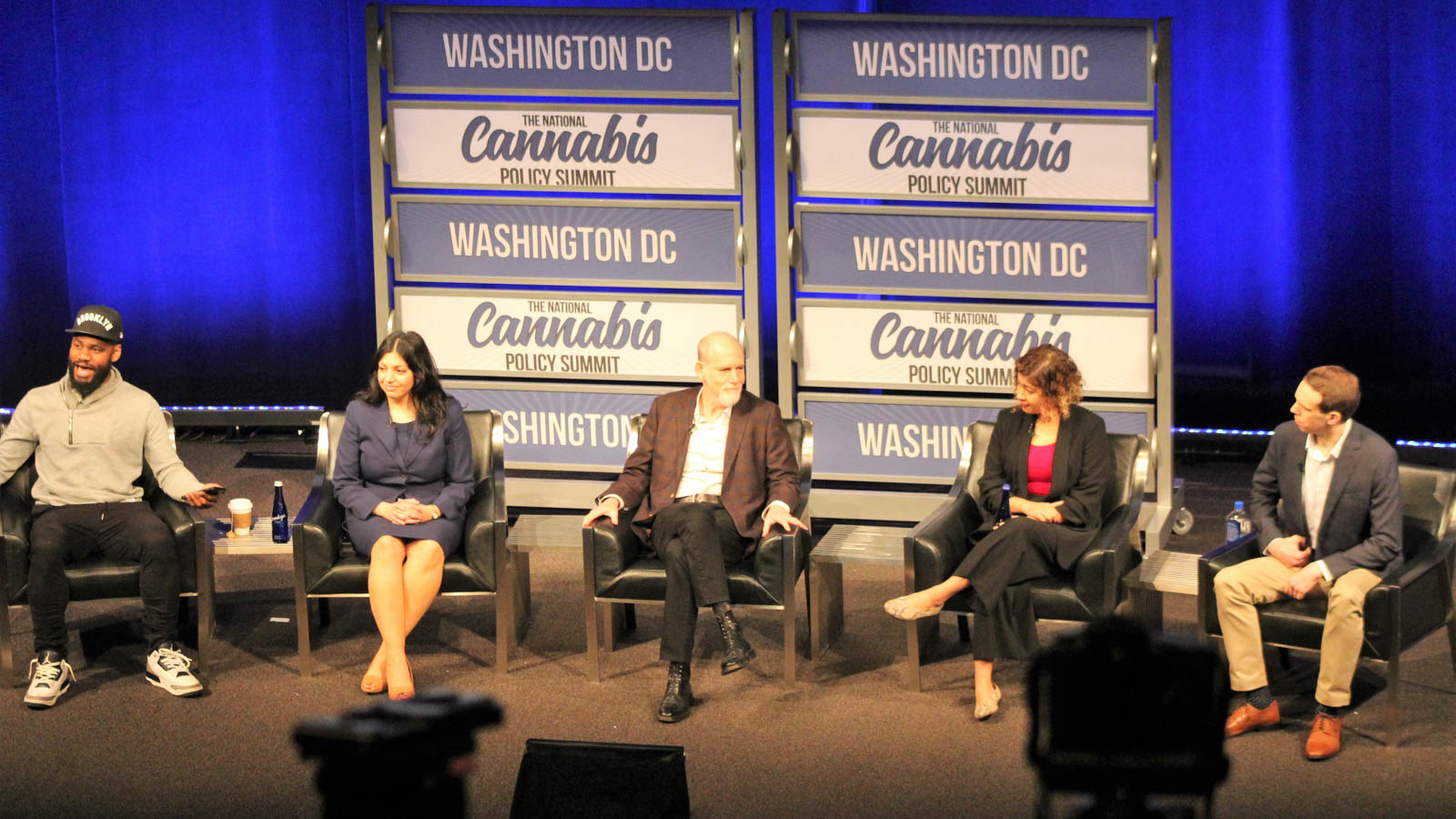
At times, the National Cannabis Festival (NCF) Policy Summit, held in Washington, D.C., on April 19, 2019, seemed like a victory lap.
That’s how Ethan Nadelmann, the founder and former of director of the Drug Policy Alliance (DPA), put it at the start of the daylong series of discussions on national marijuana policies held at the Newseum. He said the cannabis reform movement still has work to do, “but [it’s] a victory lap nonetheless.”
Ethan Nadelman, founder and former executive director of the Drug Policy Alliance, speaks at the NCF policy summit in Washington, D.C. (Photo by Bill Barlow)
The event, a more sober preview to the National Cannabis Festival the next day on 4/20, numerous speakers during several panel discussions predicted that federal legalization of marijuana is coming soon. Throughout the day, video messages of support were shown from national political figures, including Democratic Sen. Elizabeth Warren of Massachusetts, Senate Minority Leader Chuck Schumer of New York, and others.
“Let’s appreciate the magnitude of the transformation that has happened,” Nadelmann said.
Decades ago, about three-quarters of Americans opposed any kind of legalization of marijuana. Now, according to statistics presented at the event by Celinda Lake, president of the polling and political strategy consulting firm Lake Research Partners, most Americans favor legalization.
“This is something that has moved in our culture very, very fast. Way ahead of our laws,” she said.
Celinda Lake, president of the polling and political strategy consulting firm Lake Research Partners, speaks April 19, 2019, at the NCF policy summit about the demographics of marijuana reform. (Photo by Bill Barlow)
Lake said support for legalization is growing across the political spectrum and among widely divergent demographics.
“This is very rapidly changing, and we have a good, solid two-thirds of the voters that support legalization,” Lake said. Further, she added that the issue has bipartisan consensus, unites progressives, the libertarian arm of the GOP and Democrats. Pro-legalization sentiment is especially strong among independent voters and is growing rapidly among Republicans, she said. Nationally, however, a slim majority of Republicans oppose legalization. Supporters of President Donald Trump are more likely to support legalization than other Republicans, she said.
“But the best news is that 70% of millennials support legalization,” she said. “So that’s good news for the future.”
The best news is that 70% of millennials support legalization. That’s good news for the future. Click To Tweet
Her comments came during an afternoon panel discussion called “If to How: How Can the Path to Federal Legalization Inform State Law,” which explored what the movement toward full legalization for adult use may look like in the coming years.
Leading that panel, Jon Fasman, Washington correspondent for The Economist, said that just a decade ago, expecting nationwide marijuana legalization would have seemed nuts. He and other speakers now see national action on the issue as increasingly likely in the short term.
But that does not mean the work is over.
Much of the discussion among activists, officials and industry leaders delved into what legalization can and should look like in the coming years, and what those policy choices may mean for consumers, the emerging cannabis industry, and the planet.
Several of the panel discussions addressed how to ensure social justice and a fair share of the new industry’s benefits go to communities that have faced the worst impacts of decades of marijuana criminalization. A large part of the conversation was how to make certain that minorities and women will be able to reap the benefits of this rapidly expanding industry.
Tony Lewis, Jr., a community activist and author of ‘Slugg: A Boy’s Life in the Age of Mass Incarceration,” speaks at the NCF policy summit panel about victims of the failed war on drugs on April 19, 2019. (Photo by Bill Barlow)
Just as the LGBTQ rights movement looked to the civil rights and women’s movements for guidance and inspiration, several speakers compared the current push for cannabis rights to the movement for marriage equality. Nadelmann described those who worked on that issue as “older siblings” in the cause of personal freedom and social justice.
It’s an apt comparison, according to Nathan Kasai, a senior policy counsel with Third Way, a center-left think tank based in Washington, D.C. In each, the change in public perception was both sweeping and precipitous as horror stories used by reform opponents fell apart in the face of experience.
“Personal messages and stories are hugely important,” Kasai said during the summit. He said that as a gay man, he had to have some difficult and uncomfortable discussions, but in that process, he was able to offer people new insight into an issue that might have otherwise been entirely abstract to them. “The second that you make that personal connection and you put a face to the issue, it gets really hard at the ballot box to pull the lever against that person. It’s no longer this amorphous issue that’s out there.”
Marriage equality was framed as an issue that affects loving couples. For marijuana advocates, the issue can similarly be framed in personal terms, especially when looking at the medical benefits.
“The medical benefits of marijuana are real, are substantial. We always knew that to be true, but it’s so far greater than we ever anticipated,” Nadelmann said in his opening remarks.
The medical benefits of marijuana are real, are substantial. We always knew that to be true, but it’s so far greater than we ever anticipated. Click To Tweet
Advocates called for access to medical cannabis for veterans.
Other panels looked at the potential impact of a national cannabis industry on the environment, both in terms of benefits connected to the removal of carbon from the atmosphere, and expressing concerns over plastic packaging, water consumption, and the use of energy for artificial lights, with some states requiring the plant to be grown indoors.
While the video presentations from senators and others were all from Democrats, the bipartisan state of the cannabis conversation Lake mentioned was evident in the speakers, with Americans for Tax Reform President Grover Norquist and Jon Blanks, a research associate with the libertarian Cato Institute, participating in the event.
Not everyone agreed on everything. Panelists disagreed on the best path forward, including whether to support the Strengthening the Tenth Amendment Through Entrusting States Act (STATES Act, or S. 3032). Introduced by Republican Sen. Cory Gardner of Colorado, and Warren, a Massachusetts Democrat, along with several co-sponsors on both sides of the aisle, the STATES Act would offer federal recognition to state laws that have legalized marijuana either with a doctor’s recommendation or for adult use.
Some speakers at the summit said the act doesn’t go far enough, and suggested advocates are now in a position to push for the best possible legislation. Others argued it was a good bill, and more importantly, one that could be passed in the current Congress. Trump has indicated a willingness to sign the bill if it reaches his desk.
Other fractures were also apparent. Nadelmann described it as infuriating that many see the current progress toward ending cannabis prohibition as being driven by corporate interests and big money.
“We got where we were because of the of momentum activists and families and patients and philanthropists and people who cared about doing this for the right reason,” he said. While some in the new industry give lip service to issues of social justice, he said, he would like to see recognition for the efforts and motivation of those who have gotten the movement this far.
Disclosure: Weedmaps was a sponsor of the National Cannabis Festival.
Featured image: Panelists at the National Cannabis Policy Summit in Washington, D.C., speak about the responsibilities of journalists covering cannabis and the war on drugs. (Photo by Bill Barlow)












